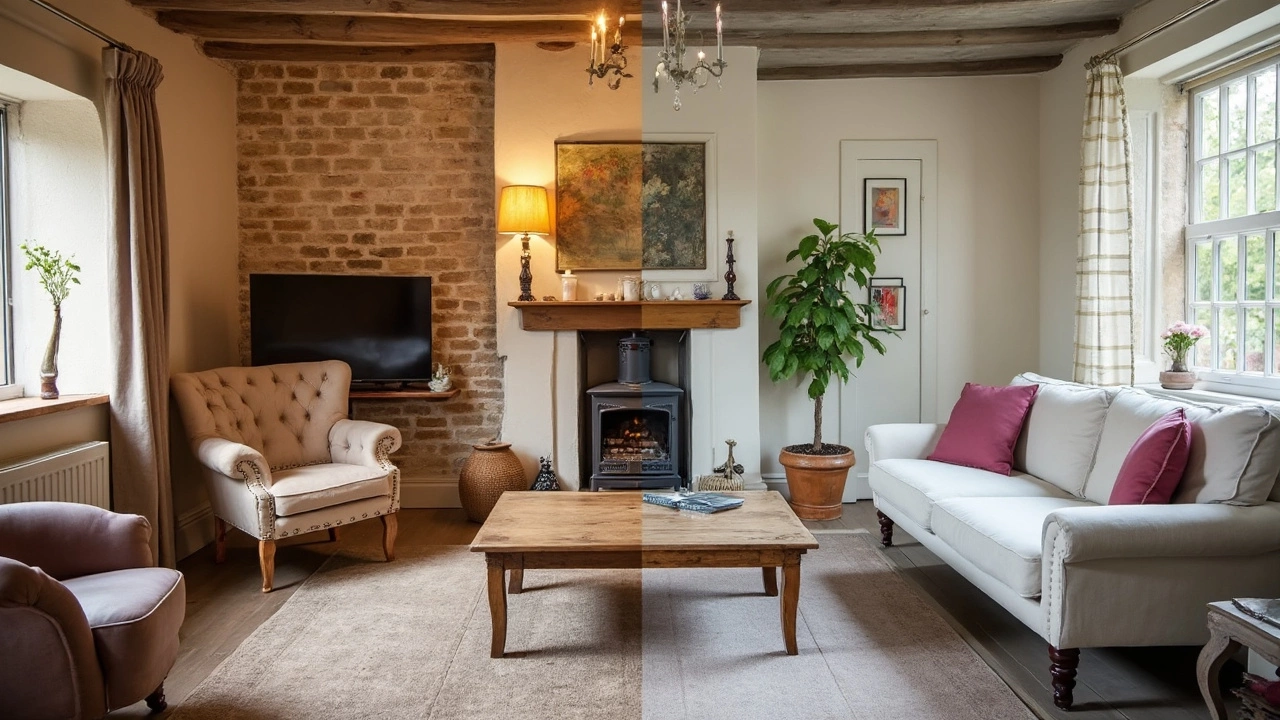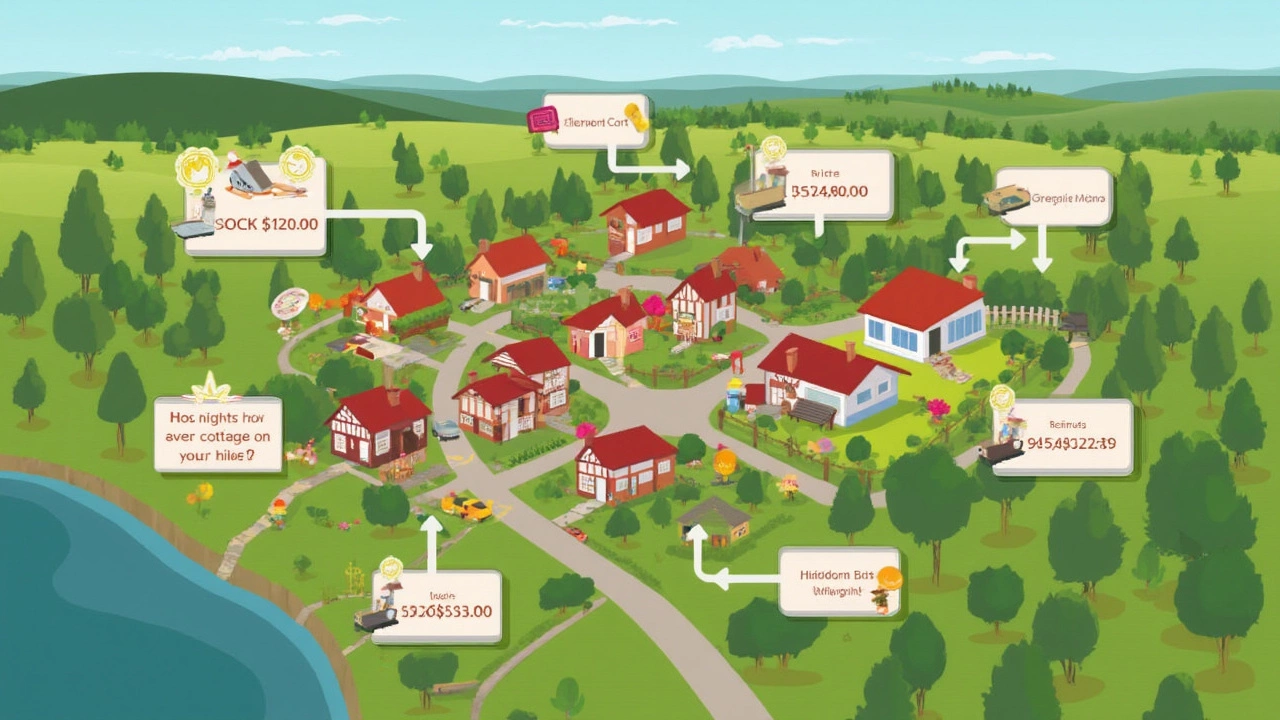Cottages have this reputation for being super affordable, like some kind of cozy secret for smart travelers. But do they really save you money compared to renting a regular house for your holiday? It’s not as clear-cut as some booking sites want you to believe.
If you’ve ever browsed vacation rentals, you’ve probably noticed the prices jump all over the place. A tiny stone cottage in the countryside might look dirt cheap at first glance, but once you tack on cleaning fees, service charges, and the cost of driving out to the middle of nowhere, things can add up fast. And just because a cottage is smaller doesn’t always mean it’s less expensive — sometimes, it’s about what’s included and where it’s located.
So, how do you actually make the call on which is cheaper — a cottage or a house? The answer really depends on what you need, how you travel, and what kind of experience you want. There are a few details most people miss when comparing prices, and those can seriously mess with your budget plans.
- Why People Think Cottages Are Cheaper
- What Actually Drives the Price
- Hidden Costs and Surprises
- Comparing Value: Cottage Perks vs. House Extras
- Smart Booking Tips for Affordable Cottages
Why People Think Cottages Are Cheaper
The idea that cottages are the cheap option for getaways is everywhere. You see photos of simple country retreats online, and the price per night often looks lower than what you’d pay for a city house or bigger vacation rental. But is that just clever marketing or is there more behind it?
First off, the sizes are usually different. Cottages are often smaller—think one or two bedrooms, maybe a compact kitchen, and a little living space. When you compare that to full-size houses built for families or groups, it makes sense that the base price might be lower. Fewer rooms, lower cost—at least on paper.
Another reason is location. Lots of holiday cottages are in rural spots or small towns. Real estate costs are lower there, so owners can charge less. Travel surveys in the UK have shown that rural rentals can be up to 30% cheaper than comparable stays near tourist hotspots or big cities. That price difference really jumps out when you’re scrolling booking sites.
People also expect fewer amenities. Most folks booking a cottage aren't looking for swimming pools, gyms, or plush living rooms. The expectation is simple, cozy, and basic—so you tend to spend less because you’re not paying for extras.
Cottage owners usually target longer stays, too. Weekly or monthly bookings sometimes come with serious discounts, which doesn’t happen as often with larger houses or city rentals. If you’re flexible with your dates, cottages might seem like a bargain upfront.
- Smaller size means lower cleaning and utility costs
- Less expensive areas lead to cheaper night rates
- Basic amenities keep the price low
- Discounts for longer stays make the weekly total drop
All of these points feed the idea that cottages let you holiday for less. But that’s not always the full story—you’ll see why in the next section.
What Actually Drives the Price
When people ask if cottages are really cheaper, the answer depends on more than just the nightly rate. Loads of things can push prices up or down. The biggest player? Location. A cottage right in a tourist hotspot—think Cornwall, Lake District, or anywhere near a famous beach—will cost way more than one tucked away in a quieter or less popular area. Demand goes up and so do the prices, especially during school holidays or big local events.
Size is the next big thing. A cute, tiny place for two? Usually cheaper than a three-bedroom house, sure. But pack it with special features—hot tub, fireplace, fancy views—and costs climb fast. "Character properties" can sometimes be pricier just because of their charm or unique setting, even if they’re smaller.
Then there are the extras nobody talks about at first glance. Here’s a breakdown of common add-on costs you might see when booking a holiday cottage versus a traditional house:
- Cleaning fees
- Booking or service charges
- Linen and towel rental (not always included in cottages!)
- Heating or electric (sometimes metered in rural cottages)
- Parking costs
If you thought you’d save a bundle by skipping a proper house, these extras might surprise you.
Still curious about the numbers? Here’s a side-by-side comparison to give you a real-world idea:
| Feature | Average Cottage (per week) | Average House (per week) |
|---|---|---|
| Base Rental (peak season, UK) | £750 | £950 |
| Cleaning/Service Fees | £60 | £80 |
| Linen/Towels | £20 (sometimes extra) | Included |
| Utilities | £40 (may be metered) | Included |
| Parking | Free or £10-£30 (rural spots may be free) | Usually included |
The numbers show that while cottages can be cheaper, the final cost depends on all these details. If you start adding things like pet fees or extra guests, the gap between a cottage and a regular house gets even smaller. Always check what's included and read the listing fine print before you book—surprises here are not fun.

Hidden Costs and Surprises
Most people check the nightly rate, think it looks like a great deal, and book without a second thought. After all, isn’t a holiday cottage supposed to be cheap and cheerful? Here’s where things get a little tricky. There are extra charges that can turn that “cheap” getaway into a pricier trip than you planned.
First off, cleaning fees. Loads of cottage rentals now add a fixed cleaning fee that’s sometimes almost as much as a single night. That’s on top of what you already pay per night, and you often won’t spot it until you’re at the final booking step. Those extra fees can sneak up fast, especially for shorter stays.
Next are utility costs. While most holiday cottages include things like water, gas, and electricity, some rural spots use meters. You could be asked to pay for what you use, especially in properties run by private owners instead of big companies. Always check if utilities are included, or you might get an unpleasant bill at check-out.
Don’t forget about transport. Cottages tend to be in the countryside, so you might need a car. If the public transport isn’t great, consider fuel costs, parking, or even renting a vehicle. It all goes on the holiday tab.
Then there’s the fine-print stuff: damage deposits (which can tie up a few hundred pounds on your card), pet fees if you’re bringing your dog, and charges for extra guests. Some places even charge for things like firewood or use of amenities like hot tubs.
- Always double-check the full list of fees before booking.
- If something looks suspiciously cheap, scroll down and read the terms for extra charges.
- Ask about what's included, especially with rural cottages—don’t assume you get towels, Wi-Fi, or unlimited heating.
If you’re sticking to a tight budget and want the real story on holiday cottages being cheaper than houses, these side costs are make-or-break. Your best bet is to list out every fee and compare, penny for penny, before deciding. Sometimes the fancy house in town actually ends up costing less than the “bargain” cottage in the woods.
Comparing Value: Cottage Perks vs. House Extras
When picking between a holiday cottage and a traditional house, it’s not just about the price tag. The real difference shows up in the perks and extras you get—or sometimes don’t get—with each type of place. Here’s how it breaks down.
Holiday cottages tend to feel more private and unique. You’ll often get local touches—like a quirky fireplace, a garden, or even a hot tub—especially in rural spots. A lot of cottages are owned by people who put a bit more personality into the place, compared to a basic rental house that’s set up more like a hotel alternative.
Traditional rental houses, though, are usually bigger and can handle larger groups better. If you’ve got a big family or a crew of friends, a house often means more bathrooms, bigger kitchens, and living space where nobody’s bumping elbows. They’re also more likely to be closer to shops or city attractions, so you’re not always driving for every little thing.
- Holiday cottages: charm, privacy, garden or outdoor space, local character, unique design, pet-friendly options
- Houses: more square footage, more bedrooms and bathrooms, sometimes a pool or large deck, easier parking, often better location for grocery runs or sightseeing
It’s easy to think cottages are always cheaper, but some amenities bump up the price. For example, a cottage with a private beach or hot tub often costs more per night than a basic house in the suburbs. You’re also paying for the experience—people are happy to shell out a bit more for the cottage atmosphere.
Check out how typical features compare across the two:
| Feature | Average Cottage | Average House |
|---|---|---|
| Average size (sq. ft.) | 700–1,200 | 1,400–2,000 |
| Outdoor space | Often private garden | Yard or shared space |
| Kitchen amenities | Basic to full | Full, more counter space |
| Pet-friendly | 50% allow pets | 35% allow pets |
| Location | Rural, scenic | Suburban or urban |
| Wi-Fi/tech | Mixed, sometimes spotty | Usually reliable |
If you care most about a unique holiday vibe, a holiday cottage can be the way to go, even if it means giving up a bit of space or easy access to city stuff. But if you value convenience and elbow room for a group, a house might stretch your money further. Just weigh what’s on your must-have list before you decide—sometimes those “extras” make the biggest difference in the whole trip.

Smart Booking Tips for Affordable Cottages
Not all cottages are cheap, but with a little strategy, you can keep costs down and dodge those sneaky extra fees. Here’s what really makes a difference when you’re picking and booking a cottage for your holiday.
- Book Off-Peak: Prices for holiday cottages can drop by 30% or more if you avoid the school holidays or summer weekends. If you have flexible travel dates, aim for early spring or late autumn.
- Start Early, But Watch for Last-Minute Deals: Booking early often lands you the widest choice and sometimes loyalty discounts. That said, some sites ramp up last-minute deals to fill empty spots—if you can wait, those savings can be big.
- Double-Check the Extras: Pay attention to things like cleaning fees, linen rentals, and energy charges. These can add £50-£200 to your stay, especially in rural spots. Always read the fine print before you hit “book.”
- Check What’s Included: Some cottages provide firewood, bikes, or even basic groceries — others charge extra. Look for rentals with amenities that match your needs so you don’t end up forking out for stuff you thought was included.
- Location Counts: Cottages near major tourist areas or the coast cost way more than a spot a few miles inland. If you’re okay with a short drive, choosing rural over coastal spots can save quite a bit.
- Share the Space: Traveling with friends or family? Splitting the cost can make bigger cottages better value per person than booking two small places.
Here’s how those costs might look in real numbers:
| Type | Nightly Base Rate (£) | Cleaning Fee (£) | Linen/Utilities (£) | Total for 3 Nights (£) |
|---|---|---|---|---|
| Coastal Cottage (peak) | 180 | 85 | 40 | 665 |
| Country Cottage (off-peak) | 90 | 50 | 20 | 290 |
| Detached House (peak) | 220 | 100 | 50 | 810 |
See the difference? Booking smart is all about knowing when to snag your deal, being honest about what you actually need, and reading the details before you commit. Watching for hidden charges and looking a little off the beaten path can make that cottage holiday way more affordable than you thought.
